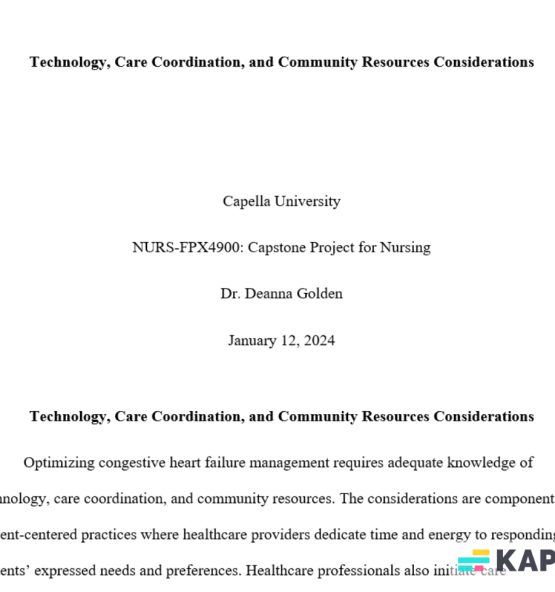
Technology, Care Coordination, and Community Resources Considerations
Capella University
NURS-FPX4900: Capstone Project for Nursing
Dr. Deanna Golden
January 12, 2024
Availability:In Stock
Optimizing congestive heart failure management requires adequate knowledge of technology, care coordination, and community resources. The considerations are components of patient-centered practices where healthcare providers dedicate time and energy to responding to patients’ expressed needs and preferences. Healthcare professionals also initiate care coordination and technology use to streamline access to information, education, emotional support, and other interventions that relieve anxiety associated with CHF management (Halatchev et al., 2020). This project encourages patients to utilize technologies such as telehealth and community resources that enhance improvements in emotional, physical, and mental wellness. Consistent efforts promote greater certainty regarding CHF, recovery, and self-efficacy.
Technology strengthens interdisciplinary integrated care relevant for improving the quality, cost, and safety of patient care. The concept makes the care team responsive to challenges triggered by one of the incapacitating and progressive conditions. Notably, CHF management goals entail improving symptoms, restoring functional capacity, and empowering patients to make informed decisions on best practices for reducing social and economic burden of the disease. Telehealth is among the viable technologies for patients to achieve the goals. The tool facilitates remote patient management to optimize care processes through agile patient status monitoring (Silva-Cardoso et al., 2021). Patients access care from their convenient locations. Similarly, telehealth is a tool that supports accessible and continuous education, promotion, and medication adherence.
Patients have increased control of the disease process due to their close proximity to primary care providers and specialists. Telehealth is also ideal for overcoming inequalities, reducing overload on health systems, and reducing costs (Zhu et al., 2020). Patients benefit from teleconsultations that improve assessment of symptoms, weight, blood pressure, and other physical signs. The technology is also applicable for follow-ups, appointments, and rehabilitation exercises that promote agile communication between patients and healthcare providers (Zhu et al., 2020). However, successful adoption of telehealth depends on stakeholders’ ability to overcome costs and barriers associated with the tool. Internet connectivity, technological adherence, and education are considerations that make telehealth ideal for managing CHF.
Care coordination is a priority for successful management of CHF. The process means embracing excellent communication to support patients when hospitalized and after discharge. As patients understand their health care needs and quality outcomes better, it is necessary to improve experiences through care coordination (Geiger et al., 2020). The Centers for Medicare & Medicaid Services (CMS) encourages healthcare providers to create an environment that fosters and improves the quality of care. One advantage of care coordination is increased access and availability of essential health services (Geiger et al., 2020). The concept boost patient engagement through flexible access to information, scheduling of appointments, and access to support services. Patients also benefit from reduced travels due to multidisciplinary appointments, streamlined clinical care, and reduced redundancies across the care continuum. This project focuses on the need for integrated hospital services, patient needs, and information flow to meet expectations for exceptional CHF care. Patients feel empowered as active participants with the autonomy to make informed choices about treatment pathways and decisions necessary to improve quality of life (Geiger et al., 2020). Primary care providers and specialists collaborate to design health goals and embrace proactive patient engagement throughout the care process.
Reviews
There are no reviews yet.